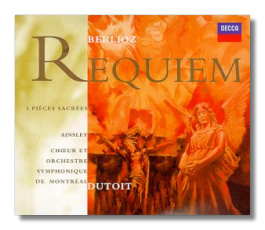
The Internet's Premier Classical Music Source
Related Links
- Berlioz Reviews
- Latest Reviews
- More Reviews
-
By Composer
-
Collections
DVD & Blu-ray
Books
Concert Reviews
Articles/Interviews
Software
Audio
Search Amazon
Recommended Links
Site News
 CD Review
CD Review
Hector Berlioz

Requiem
- Requiem
- 5 Pièces sacrées
- Veni creator
- Tantum ergo
- Pater noster
- Adoremus
- Resurrexit
John Mark Ainsley, tenor
Montréal Symphony Orchestra & Chorus/Charles Dutoit
Decca 458921-2 DDD 2CDs 55:58, 54:24
I am surprised that it took Dutoit this long to get around to recording Berlioz's Requiem. (L'Enfance du Christ, another gap in his Berlioz discography, will be released soon.) Actually, this recording was taped in May 1997 in Montréal's St. Jérome, and it is curious that it has taken almost three years for the discs to be released.
We know what to expect from Dutoit and Berlioz, and there are no big surprises here. Dutoit is too much the gentleman to storm the heavens, and so this is a kindlier, gentler Requiem, not one that chases you around your home screaming at you. There's room on this Earth for such a thing. I compared this new recording with Sir Colin Davis's Philips discs, which now are more than 30 years old. Davis's engineers let him down in the Dies irae, which comes close to sonic chaos on the CDs, and was not much better on the original LPs. Dutoit gets better results, but it also needs to be said that he doesn't seem interested in the massive effects that Davis churned out. From the opening phrases of the Requiem et Kyrie, Dutoit breathes a promise of eternal salvation. Even the Offertorium, a Doré-like procession of zombies in the Philips set, seems more gently hypnotic than inexorable here. Ainsley sings the Sanctus with good style, although it strains his vocal resources. Dutoit's choir sounds smaller than Davis's, and it also sounds younger, an advantage it shares with conductor Charles Munch's chorus on his classic RCA Victor recording from Boston. The innocence of their timbres also seems to indicate that the pains of eternal damnation are something that happens to other people only. All in all, this is a fine Requiem, particularly if you desire less drama and more beautiful musicianship.
Dutoit fills the second disc with five shorter choral works. The Veni creator and Tantum ergo are late pieces – simple, modest, and not very representative of the composer. The former is a cappella, and the latter has organ accompaniment. The Montréal women sing them with touching virginity. Pater noster and Adoremus are Berlioz's arrangements of originals by Dmitri Bortniansky. They also are well suited to performance by amateurs. The disc closes with a bang. Resurrexit comes from the otherwise destroyed Mass that Berlioz wrote as a student in 1824, 13 years before he started on the Requiem. Parts of this movement were reworked into the Requiem's Dies irae. The Resurrexit demonstrates how the young Berlioz loved apocalypse. It's sound and fury, and while it signifies more than nothing, it's easy to feel a bit beaten up by the end. Fortunately, it's only seven minutes long. Berlioz, for all his instrumental and vocal demands, at least was economical with time when he decided to bring the world to an end!
Copyright © 2000, Raymond Tuttle


















